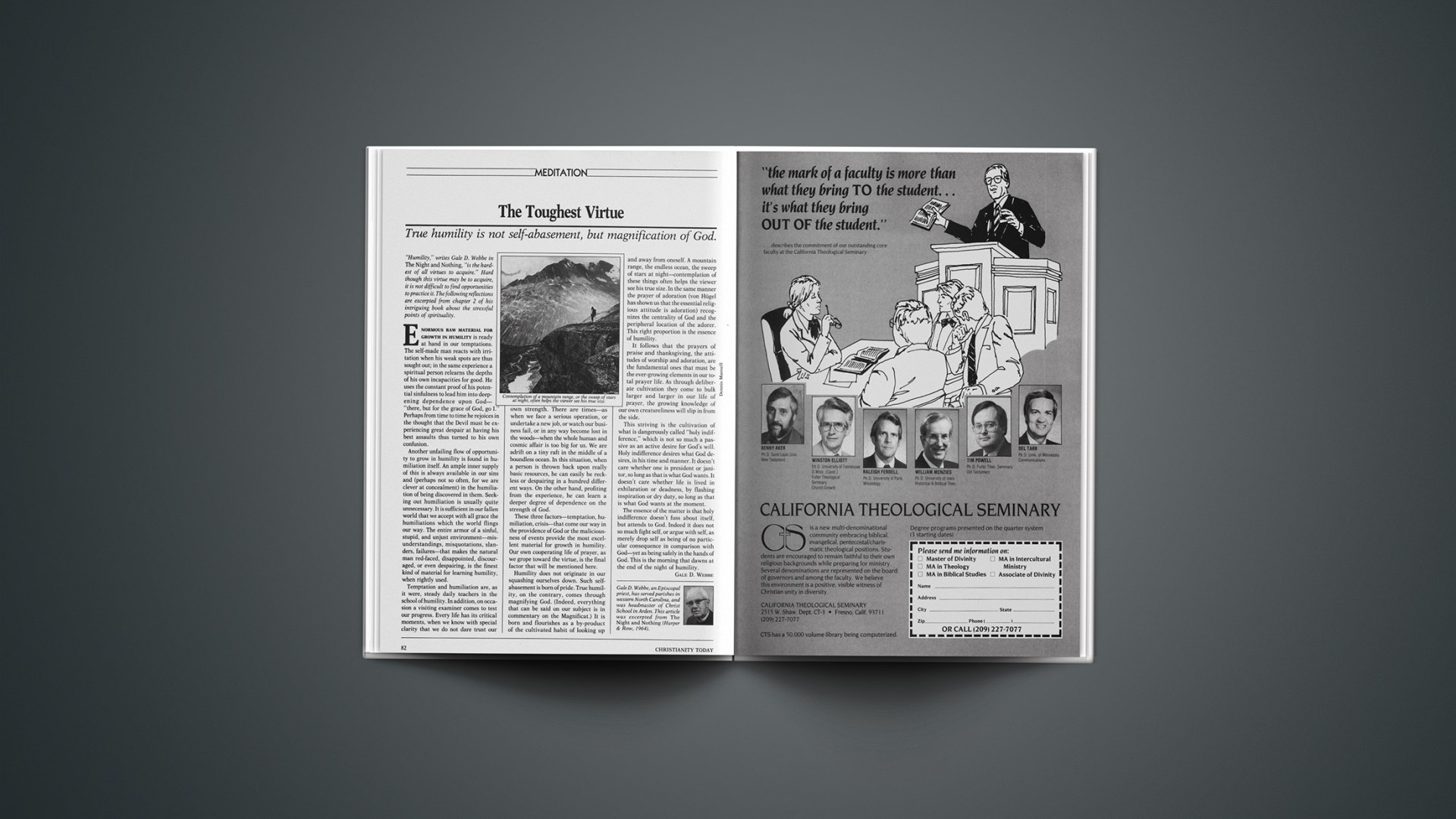True humility is not self-abasement, but magnification of God.
“Humility,” writes Gale D. Webbe in The Night and Nothing, “is the hardest of all virtues to acquire.” Hard though this virtue may be to acquire, it is not difficult to find opportunities to practice it. The following reflections are excerpted from chapter 2 of his intriguing book about the stressful points of spirituality.
Enormous raw material for growth in humility is ready at hand in our temptations. The self-made man reacts with irritation when his weak spots are thus sought out; in the same experience a spiritual person relearns the depths of his own incapacities for good. He uses the constant proof of his potential sinfulness to lead him into deepening dependence upon God—“there, but for the grace of God, go I.” Perhaps from time to time he rejoices in the thought that the Devil must be experiencing great despair at having his best assaults thus turned to his own confusion.
Another unfailing flow of opportunity to grow in humility is found in humiliation itself. An ample inner supply of this is always available in our sins and (perhaps not so often, for we are clever at concealment) in the humiliation of being discovered in them. Seeking out humiliation is usually quite unnecessary. It is sufficient in our fallen world that we accept with all grace the humiliations which the world flings our way. The entire armor of a sinful, stupid, and unjust environment—misunderstandings, misquotations, slanders, failures—that makes the natural man red-faced, disappointed, discouraged, or even despairing, is the finest kind of material for learning humility, when rightly used.
Temptation and humiliation are, as it were, steady daily teachers in the school of humility. In addition, on occasion a visiting examiner comes to test our progress. Every life has its critical moments, when we know with special clarity that we do not dare trust our own strength. There are times—as when we face a serious operation, or undertake a new job, or watch our business fail, or in any way become lost in the woods—when the whole human and cosmic affair is too big for us. We are adrift on a tiny raft in the middle of a boundless ocean. In this situation, when a person is thrown back upon really basic resources, he can easily be reckless or despairing in a hundred different ways. On the other hand, profiting from the experience, he can learn a deeper degree of dependence on the strength of God.
These three factors—temptation, humiliation, crisis—that come our way in the providence of God or the maliciousness of events provide the most excellent material for growth in humility. Our own cooperating life of prayer, as we grope toward the virtue, is the final factor that will be mentioned here.
Humility does not originate in our squashing ourselves down. Such self-abasement is born of pride. True humility, on the contrary, comes through magnifying God. (Indeed, everything that can be said on our subject is in commentary on the Magnificat.) It is born and flourishes as a by-product of the cultivated habit of looking up and away from oneself. A mountain range, the endless ocean, the sweep of stars at night—contemplation of these things often helps the viewer see his true size. In the same manner the prayer of adoration (von Hügel has shown us that the essential religious attitude is adoration) recognizes the centrality of God and the peripheral location of the adorer. This right proportion is the essence of humility.
It follows that the prayers of praise and thanksgiving, the attitudes of worship and adoration, are the fundamental ones that must be the ever-growing elements in our total prayer life. As through deliberate cultivation they come to bulk larger and larger in our life of prayer, the growing knowledge of our own creatureliness will slip in from the side.
This striving is the cultivation of what is dangerously called “holy indifference,” which is not so much a passive as an active desire for God’s will. Holy indifference desires what God desires, in his time and manner. It doesn’t care whether one is president or janitor, so long as that is what God wants. It doesn’t care whether life is lived in exhilaration or deadness, by flashing inspiration or dry duty, so long as that is what God wants at the moment.
The essence of the matter is that holy indifference doesn’t fuss about itself, but attends to God. Indeed it does not so much fight self, or argue with self, as merely drop self as being of no particular consequence in comparison with God—yet as being safely in the hands of God. This is the morning that dawns at the end of the night of humility.
Gale D. Webbe, an Episcopal priest, has served parishes in western North Carolina, and was headmaster of Christ School in Arden. This article was excerpted from The Night and Nothing (Harper & Row, 1964).










